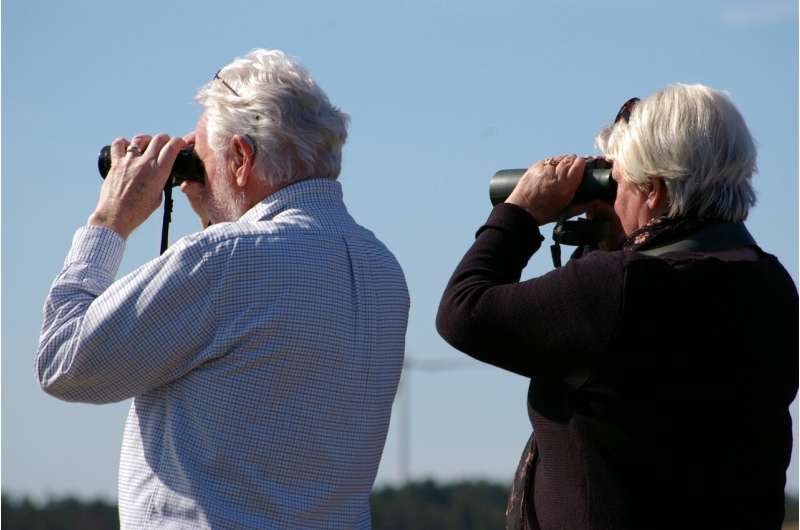Economists warn of side effects of raising the retirement age
Leaving paid work opens the door to potentially the best stage of life, and a new study published in The Economic Journal confirms the health and well-being benefits that can stem from retirement via an individual’s increased “locus of control,” a psychological trait capturing the personal sense of control or power over life outcomes.
Using data from the nationally representative Household, Income and Labor Dynamics in Australia (HILDA) Survey, the study found up to one-third of the positive health effects of retirement are directly due to this personal sense of control.
At a time when pressures are mounting to raise the pension age in several countries around the world, the study by experts from Flinders University and the Paris School of Economics is a timely reminder.
“This greater internal control explains one-third of the positive effects of retirement on health and about one-fifth of improved subjective well-being,” says Dr. Rong Zhu, Senior Lecturer in Economics at the Flinders University College of Business, Government and Law.
“However, we note these positive results are heavily skewed to the less educated, people living in cities and having received welfare payments, and those with no long-term health conditions.
“We need to consider the unintended consequences of delayed retirement for health and well-being via a reduced sense of internal locus of control.
“If workers work beyond retirement age, they are less likely to consider life outcomes as a result of their own choices and actions,” says Dr. Zhu.
The public pension take-up rate for the Australian Age Pension is the second highest in all of the OECD countries, with about 70% of Australian retirees receiving either a partial or full pension.
The study focused on the eligible age for the Australian Age Pension, which increased from 60 to 67 for Australian women during 1995–2023 and from 65 to 67 for men during 2017–2023.
With Professor Andrew Clark from the Paris School of Economics, the study investigates the potential changes in socio-emotional skills in people as they finish their working life.
In contrast to locus of control, the other socio-emotional skills of the “Big Five” personality traits (agreeableness, conscientiousness, emotional stability, extroversion and openness to experience), risk and time preferences, and trust are the much less malleable among older Australians when they retire.
The study could be used to help develop positive models for future policy, production frameworks, preferences, expectations and constraints in determining economic outcomes.
More information:
Andrew E Clark et al, Taking Back Control? Quasi-Experimental Evidence on the Impact of Retirement on Locus of Control, The Economic Journal (2023). DOI: 10.1093/ej/uead118
Citation:
Economists warn of side effects of raising the retirement age (2024, March 20)
retrieved 20 March 2024
from https://phys.org/news/2024-03-economists-side-effects-age.html
This document is subject to copyright. Apart from any fair dealing for the purpose of private study or research, no
part may be reproduced without the written permission. The content is provided for information purposes only.

Leaving paid work opens the door to potentially the best stage of life, and a new study published in The Economic Journal confirms the health and well-being benefits that can stem from retirement via an individual’s increased “locus of control,” a psychological trait capturing the personal sense of control or power over life outcomes.
Using data from the nationally representative Household, Income and Labor Dynamics in Australia (HILDA) Survey, the study found up to one-third of the positive health effects of retirement are directly due to this personal sense of control.
At a time when pressures are mounting to raise the pension age in several countries around the world, the study by experts from Flinders University and the Paris School of Economics is a timely reminder.
“This greater internal control explains one-third of the positive effects of retirement on health and about one-fifth of improved subjective well-being,” says Dr. Rong Zhu, Senior Lecturer in Economics at the Flinders University College of Business, Government and Law.
“However, we note these positive results are heavily skewed to the less educated, people living in cities and having received welfare payments, and those with no long-term health conditions.
“We need to consider the unintended consequences of delayed retirement for health and well-being via a reduced sense of internal locus of control.
“If workers work beyond retirement age, they are less likely to consider life outcomes as a result of their own choices and actions,” says Dr. Zhu.
The public pension take-up rate for the Australian Age Pension is the second highest in all of the OECD countries, with about 70% of Australian retirees receiving either a partial or full pension.
The study focused on the eligible age for the Australian Age Pension, which increased from 60 to 67 for Australian women during 1995–2023 and from 65 to 67 for men during 2017–2023.
With Professor Andrew Clark from the Paris School of Economics, the study investigates the potential changes in socio-emotional skills in people as they finish their working life.
In contrast to locus of control, the other socio-emotional skills of the “Big Five” personality traits (agreeableness, conscientiousness, emotional stability, extroversion and openness to experience), risk and time preferences, and trust are the much less malleable among older Australians when they retire.
The study could be used to help develop positive models for future policy, production frameworks, preferences, expectations and constraints in determining economic outcomes.
More information:
Andrew E Clark et al, Taking Back Control? Quasi-Experimental Evidence on the Impact of Retirement on Locus of Control, The Economic Journal (2023). DOI: 10.1093/ej/uead118
Citation:
Economists warn of side effects of raising the retirement age (2024, March 20)
retrieved 20 March 2024
from https://phys.org/news/2024-03-economists-side-effects-age.html
This document is subject to copyright. Apart from any fair dealing for the purpose of private study or research, no
part may be reproduced without the written permission. The content is provided for information purposes only.
